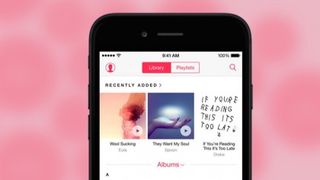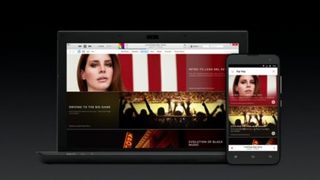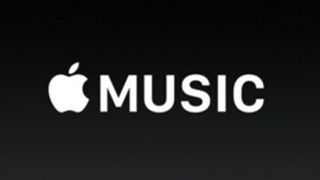Apple Music has Spotify beat in every way – here's how
Apple Music's promises can top Spotify's progress if it does these things

There's no denying it: Apple Music has a long road ahead of it if it wants to take on - and ultimately outplay - streaming juggernaut Spotify.
Apple Music's announcement was met with equal parts skepticism and excitement, while news in recent days hasn't necessarily put it in the best light. Megastar Taylor Swift successfully pushed Apple to pay artists during Music's free, three-month trial, but not before threatening to pull her music - a move that's all-too-familiar to Spotify.
Despite its early marketing foible with content creators, can this potential juggernaut top Spotify? It's definitely possible. Here's a laundry list of the benefits Apple needs to hype up to overcome the bad buzz and topple Spotify.
Apple Music > Spotify: pricing
The biggest weapon in the war between Apple Music and Spotify is pricing, and because there's precious little difference in the cost of the two services (likely due to labels requiring price equality), Apple will need to leverage its free trial to really make a play on Spotify's subscribers.
Both services run at $9.99/month (Spotify Premium is £9.99/month and AU$11.99/month), but Apple is, quite sharply and to much chagrin from the rest of the industry, offering a three-month free trial when the service debuts. Spotify, for all its experience in the field, hasn't spoken about reducing the cost of its 99-cent three-month trial to match this offer, so Apple Music's making the right moves to tout the completely free nature of its deal.
Where Spotify does plan to match Apple Music is family plan pricing, though that isn't an official option yet. The Apple Music family plan costs $14.99/month for up to six family members, while Spotify only gives that group rate to two users. Spotify has stated that it plans to match that, but currently only offers a family plan with the first account at $9.99/month and 50% off every additional account.
So while Apple Music has the early lead with a better trial service, after the world has three months gratis Apple Music will have to reshift its strategy to drown out Spotify's free mobile and desktop options. Just how that's going to play out, however, remains a trick up Apple's sleeve.
Get daily insight, inspiration and deals in your inbox
Get the hottest deals available in your inbox plus news, reviews, opinion, analysis and more from the TechRadar team.

Apple Music > Spotify: song selection
Let's not beat around the bush, iTunes has one of the biggest and most comprehensive music libraries in the business. That said, before it just starts letting us stream all of the music carte blanche Apple will need to get approval from some, if not all, of the major music labels.
Spotify, on the other hand, numbers its library at nearly 30 million of already streamable songs, but lacks major musicians like The Beatles and Metallica. As long as Apple can cajole music megastar Taylor Swift into a deal and work its magic with many of its exclusive partners again, Apple Music will have a big advantage for fans of modern and classic pop.
Apple Music > Spotify: videos
The two music streaming giants are aiming in different directions when it comes to video accompaniment. Spotify announced at a May press conference it intends to move away from music when it comes to visual entertainment, and has plans to team up with top television studios like Comedy Central, Maker, ESPN and MTV.
Conversely, Apple Music touts tens of thousands of ad-free music videos with the intention to overtake YouTube's ad-free premium music video subscription service, not to mention the strong ties to iTunes' video rental and purchase marketplace that stands up alongside Amazon as the industry leader.
It's a stretch, but if Apple Music can stand to dip into iTunes' video library and doesn't mind shelling out some typically paid content to its subscribers, it'd easily win over a few thousand Spotifites.

Apple Music > Spotify: live content
Apple Music really has the ability to be a trend-setter with something that, ironically, has been done by others for years: live radio.
While Spotify's videos and upcoming podcast integration will keep users up-to-date on music trends and the world at large, Beats 1 will completely own the live music scene by running a 24/7, 'round-the-world program (thanks to hubs in New York, Los Angeles and London), which has full intention to break new music and deliver vital information via world-famous radio disc jockeys. Apple gets a nice leg up from one simple fact: Beats 1 is free to listen to with an Apple ID and thus should attract even casual music lovers in the 100 countries it will broadcast in.
Spotify isn't really competing in this category, so it's Apple's game to win if it can play popular-enough music to attract an audience and break enough artists to compete with terrestrial and satellite radio.
Apple Music > Spotify: artist pages
Here's another category where Apple's starting out in the lead. Spotify's artist pages don't serve as a way to give users a lifeline to a band as much as they do recommend similar music.
Apple Music "Connect" service's aim is to function more like a social media service, as musicians can share tour dates, photos, videos and exclusive tracks with fans.
But here's the rub: Connect's success is entirely dependent on its adoption by top artists. If it can't lure cultural icons to adopt the service as well as up-and-coming names to take on Bandcamp, it has a serious chance of becoming the next post-2008 MySpace.

How Apple Music can beat Spotify overall
Leave it to Apple to act like a streaming didn't exist until it came up with its own service. Arrogance aside, Apple has lofty goals and the means to achieve them, but Spotify has over a half-dozen years of streaming experience.
Objectively Apple has a library that users are already enjoying, not to mention a free option to ease users in. Apple Music will be free for all users until October thanks to that three-month trial, so it looks like Apple will sprint rather than walk out of the gate to win try and win the race.
Nick Pino is Managing Editor, TV and AV for TechRadar's sister site, Tom's Guide. Previously, he was the Senior Editor of Home Entertainment at TechRadar, covering TVs, headphones, speakers, video games, VR and streaming devices. He's also written for GamesRadar+, Official Xbox Magazine, PC Gamer and other outlets over the last decade, and he has a degree in computer science he's not using if anyone wants it.

